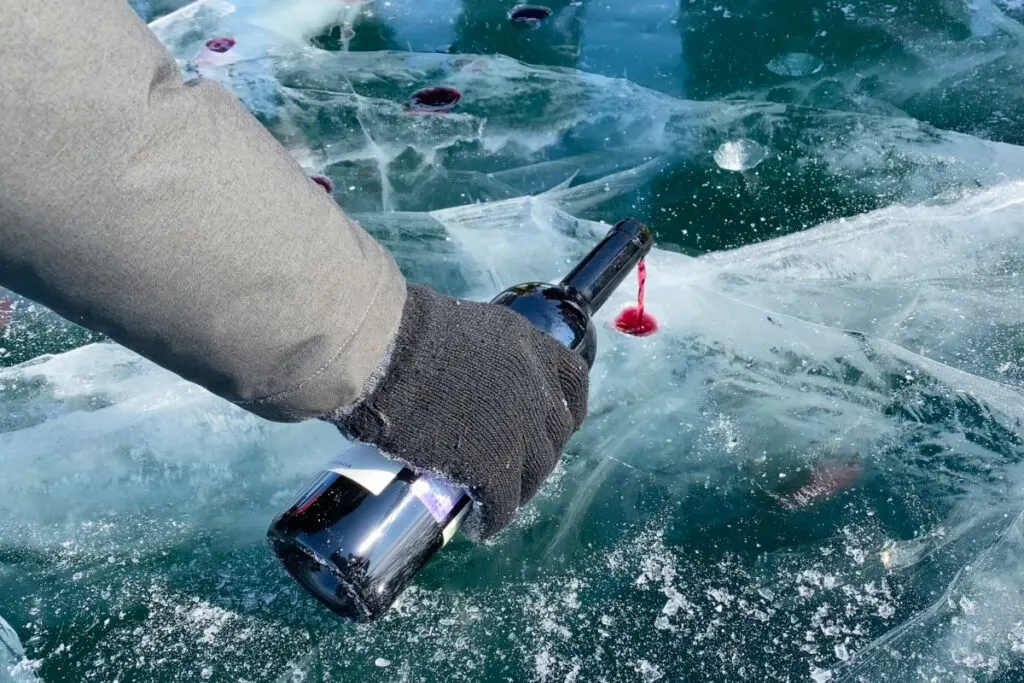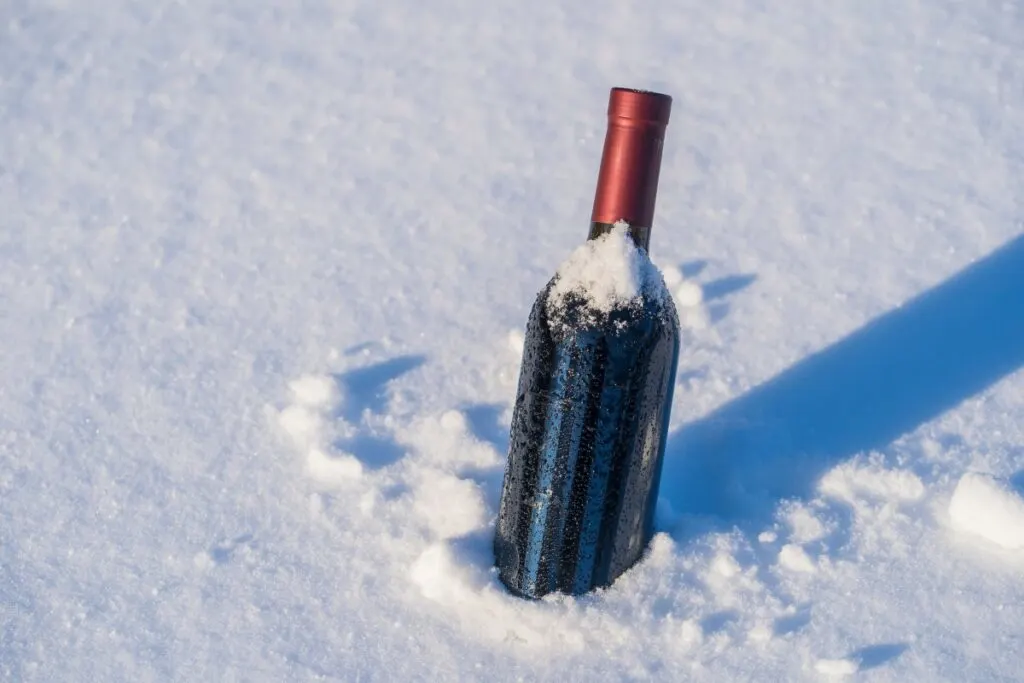As an Amazon Associate, I earn from qualifying purchases with no additional costs for you.
Technically, you can freeze wine without causing any harm to it, but it’s not recommended because freezing wine can change its taste, texture, and color.
As wine freezes, its water content expands, pushing the sugar and alcohol to the center, resulting in a more concentrated flavor. Once thawed, the wine may taste more acidic and have a slightly altered texture. The color may also become cloudy or hazy.
Moreover, the expansion when water freezes can also cause the wine bottle to crack or break, which can be messy and potentially dangerous. Read below for more information on facts and myths about freezing wine!

TIP: If you want to check out the best refrigerator for wine storage, I recommend trying out the Avation (18 bottles) compressor refrigerator with Wi-fi smart app control cooling system. You can find this refrigerator by clicking here (Amazon link).
Does Wine Freeze and Explode
Yes, wine can freeze and cause the bottle to break or explode. This is because the water content in wine expands when it freezes, and the pressure created by the expansion can exceed the strength of the glass bottle.
The likelihood of a wine bottle breaking or exploding when frozen depends on various factors, including the alcohol content, sugar content, and temperature at which it was frozen.
Generally, higher alcohol and lower sugar content wines are less likely to freeze than lower alcohol and higher sugar content wines.
To avoid the risk of a wine bottle breaking or exploding, it’s best not to freeze wine. Use a wine chiller or an ice bucket to chill your wine quickly.
If you have accidentally frozen a bottle of wine, it’s recommended to thaw it slowly in the refrigerator to minimize the risk of the bottle breaking.
Recommendation box: Everything you need to enjoy your wine as much as possible. All recommended products are personally tested and regularly used by experts from this website (Amazon links):
> Ivation Wine Cooler – Energy-efficient wine cooler for 18 bottles with Wi-fi smart app control cooling system.
> Wine Rack – Beautiful, elegant wood rack for up to 7 bottles and the choice of vertical or horizontal storage.
> Durand Wine Opener – Classic vintage wine opener (we like all these classic staff).
> YouYah Iceberg Wine Decanter – The most beautiful and handy wine decanter we personally use.
> Bormioli Rocco Wine Glasses – A set of eight elegant and traditional wine glasses made in Italy.
> Vintorio Wine Aerator – Simple but really useful wine aerator for a reasonable price.
> The Original Vacu Vin Wine Saver – The best wine saver on the market in a package with two vacuum stoppers and two wine servers.
And if you want to become a true connoisseur of wine, we recommend reading the book Wine Folly: The Essential Guide to Wine (Amazon link), where you will find all the information you need about winemaking, wine varieties, flavors, and much more.
Will Bottles of Wine Freeze
Yes, a bottle of wine can freeze if subjected to temperatures below its freezing point. The freezing point of wine depends on its alcohol content, sugar content, and other factors, but typically it is around 15-20 degrees Fahrenheit (-9 to -6 degrees Celsius).
If you leave a bottle of wine in a freezer or expose it to temperatures below its freezing point for an extended period, the water in the wine will freeze and expand. This expansion can cause the bottle to crack or break, creating a messy and potentially dangerous situation.
Therefore, it’s not recommended to freeze a bottle of wine, and if you need to chill it quickly, it’s better to use a wine chiller or an ice bucket instead. If you accidentally freeze a bottle of wine, it’s best to thaw it slowly in the refrigerator to minimize the risk of the bottle breaking.
TIP: Can You Freeze Boxed Wine? Find out the answer in this article. Can you use a water dispenser for wine? Read this article to find out.
At What Temperature Does Wine Freeze
The temperature at which wine freezes depends on its alcohol, sugar, and other factors. However, generally, the wine will start to freeze when its temperature drops below 20°F (-6°C) and will be fully frozen at around 15°F (-9°C).
The exact freezing point of wine can vary depending on the specific composition of the wine. Generally, wines with a higher alcohol content will have a lower freezing point than wines with lower alcohol content. Wines with higher sugar content, on the other hand, tend to have a higher freezing point.
TIP: Most wines go bad once you pop the cork within a day or so. But a Coravin Wine Preservation system (available for a great price on Amazon) can extend the life of your opened wine for weeks or even months. It is awesome. You should check it out to see if it fits your lifestyle.
Several things can happen at the freezing temperature for wine, including:
- Formation of Ice Crystals: When wine is cooled to the freezing temperature, the water in it starts to freeze and form ice crystals. The expansion of water during freezing can cause the wine to become more concentrated, resulting in a slightly altered flavor and texture once it is thawed.
- Separation of Components: Freezing can cause the separation of components in the wine, such as sediment or tartrate crystals, resulting in a slightly altered appearance or texture once it is thawed.
- Risk of Bottle Damage: The expansion of water during freezing can cause the bottle to crack or break, leading to wine oxidation, spoilage, or contamination.
TIP: If you want to know more about the freezing temperature of the wine, read this detailed article on the topic. Can you store wine at room temperature. This article has all the details.
Can You Freeze Wine?

You can freeze wine. It’s important to note, however, that if you freeze wine, the expansion of the water content as it freezes can cause the bottle to break or explode, which can be dangerous.
Therefore, it’s generally not recommended to freeze wine. (If you need to chill your wine quickly, it’s best to use a wine chiller or an ice bucket instead).
However, there are some instances where freezing wine might be helpful. For example, if you have an unfinished bottle of wine you’d like to save for cooking; you can freeze it in an ice cube tray and use the frozen cubes in recipes as needed. This can be a convenient way to prevent wine from going to waste.
Another use of freezing wine is to create wine granita, a frozen dessert made by scraping a frozen mixture of wine, sugar, and water. Wine granita can be a refreshing and flavorful dessert for adults.
TIP: A suitable wine glass is the basis for enjoying well-being while drinking your favorite wine variety. Here are our favorite ones (Amazon link):
- Bormioli Rocco Crystal Wine Glasses: A set of eight elegant and traditional wine glasses made in Italy for a reasonable price.
- Riedel VINUM Wine Glasses: Luxury set of two wine glasses suitable for any occasion. We just love them!
- Schott Zwiesel Tritan Crystal Glasses: If you like unusual alternatives, a set of six stemless glasses made of crystal glass.
As we mentioned above, it’s important to note that if you decide to freeze wine, it’s best to use a container that can accommodate the expansion of the liquid without breaking.
Additionally, it’s recommended to use frozen wine in cooking or as an ingredient in cocktails rather than drinking it alone.
TIP: When a bottle of wine is frozen, the liquid inside can expand and cause the glass to break or the cork to pop out. Check out the safest way to unfreeze wine in this article. Do wine bottles break easily? Discover the answer here.
Does Wine Freeze in the Freezer
Yes, wine can freeze in a freezer if exposed to temperatures below freezing point. The freezing point of wine depends on its alcohol content, sugar content, and other factors, but generally, it is around 15-20 degrees Fahrenheit (-9 to -6 degrees Celsius).
If you leave a bottle of wine in a freezer or expose it to temperatures below its freezing point for an extended period, the water in the wine will freeze and expand.
As mentioned above, this expansion can cause the bottle to crack or break, creating a messy and potentially dangerous situation.
Therefore, it’s not recommended to freeze a bottle of wine, and if you need to chill it quickly, as we suggested above, it’s better to use a wine chiller or an ice bucket instead.
If you accidentally freeze a bottle of wine, it’s best to thaw it slowly in the refrigerator to minimize the risk of the bottle breaking.
TIP: Why does my wine fridge occasionally “freeze up”? Find out the answer in this article. Read this article to debunk many popular storage myths.
Does Freezing Wine Make it Stronger
No, freezing wine does not make it stronger (or more alcoholic). The alcohol content of wine remains the same whether it’s frozen or not. However, freezing wine can alter its taste, texture, and color.
The expansion of the water content in wine as it freezes can cause the wine to become more concentrated, resulting in a slightly altered flavor and texture once it is thawed. Additionally, as mentioned above, freezing can cause the color of the wine to become cloudy or hazy.
To get a bit more technical, the alcohol content of wine does not change when exposed to different temperatures because the alcohol molecules in wine are relatively stable and do not break down or evaporate at typical storage temperatures.
Unlike some volatile compounds in wine, such as aromas and flavors, alcohol molecules do not evaporate or change their chemical structure due to temperature changes. This means that when the wine is heated, cooled, or subjected to temperature fluctuations, the alcohol content remains constant.
However, temperature changes can still affect the overall taste and aroma of the wine, as well as the rate at which it ages.
For example, high temperatures can accelerate the aging process and cause the wine to oxidize more quickly, while low temperatures can slow the aging process.
It’s worth noting that exposure to extreme temperatures, such as those that occur during freezing, can damage wine by causing the bottle to crack or break, leading to wine oxidation, spoilage, or contamination.
Therefore, it’s important to store wine at an appropriate temperature and avoid subjecting it to extreme temperature changes.
TIP: If you are interested in buying a wine decanter, I recommend purchasing these two top-quality decanters:
- USBOQO Wine Decanter (check it out on Amazon & read customer reviews)
- Iceberg Wine Decanter (check it out on Amazon & read customer reviews)
How Long Does It Take for Wine to Freeze

The time it takes for the wine to freeze can vary depending on several factors, such as the alcohol content, sugar content, and other components of the wine, as well as the temperature of the freezer or storage environment.
In general, the wine will start to freeze when its temperature drops below 20°F (-6°C) and will be fully frozen at around 15°F (-9°C). However, the time it takes to freeze can vary from several hours to overnight, depending on the wine’s characteristics and the freezer’s temperature.
As we have mentioned several times above, it’s worth noting that if you want to chill wine quickly, it’s generally not recommended to put it in the freezer, as the expansion of the water content as it freezes can cause the bottle to break or explode, which can be dangerous.
Instead, it’s best to use a wine chiller or an ice bucket to chill the wine gradually. If you accidentally freeze a bottle of wine, it’s best to thaw it slowly in the refrigerator to minimize the risk of the bottle breaking.
TIP: Are you interested in buying a wine stopper? We’ve personally tried and recommend buying one of these wine stoppers (Amazon links):
- The Original Vacu Vin Wine Saver: Our top choice. Very easy-to-use wine stopper/saver. You can enjoy a glass of fresh wine whenever you want without worrying about wasting any.
- EZBASICS Wine Saver: Great alternative to Original Vacu Vin Saver. This wine stopper keeps the flavor of wine for up to one week.
- Champagne Stopper by MiTBA: Wine stoppers for sparkling wines are different. This wine stopper seals your bottle and increases the pressure so your beverage’s bubbles won’t go to waste.
Does Freezing Wine Ruin It
Freezing wine can potentially ruin it for the following reasons:
- Alteration of Taste: When wine is frozen, the water in it expands, which can cause some of the wine’s delicate flavors and aromas to be lost or altered. This can result in a less desirable taste once the wine is thawed and consumed.
- Texture Changes: Freezing can also cause the texture of the wine to change. The expansion of water during freezing can cause the wine to become more concentrated, resulting in a thicker or syrupy texture that is not characteristic of the original wine.
- Risk of Bottle Damage: When wine is frozen, the expansion of water in it can cause the bottle to crack or break, leading to wine oxidation, spoilage, or contamination. This can potentially ruin the wine and make it unsafe to consume.
- Formation of Ice Crystals: When wine is frozen, the water in it expands, which can cause the formation of ice crystals that can damage the wine’s delicate structure and alter its taste and texture.
TIP: It’s not ideal, but as long as the bottle is intact, frozen Champagne is still safe for immediate consumption after thawing. Find out more about freezing Champagne in this article. If you want to know more about how long it takes to freeze the wine, you can with this article with my own experiment.
Conclusion
Freezing wine is not recommended. If you decide to freeze wine, it’s best to do so in a container that can accommodate the expansion of the liquid without breaking. It’s also recommended to use the wine in cooking or as an ingredient in cocktails rather than drinking it alone.
It’s also significant enough to repeat that if you freeze wine, the expansion of the water content as it freezes can cause the bottle to break or explode, which can be dangerous.
Therefore, as noted, it’s generally not recommended to freeze wine. Remember, if you need to chill your wine quickly, using a wine chiller or an ice bucket instead is best. If you accidentally freeze a bottle of wine, it’s best to thaw it slowly in the refrigerator to minimize the risk of the bottle breaking.
Some specific reasons not to freeze wine that we learned in the article above are:
- Separation of Components: Freezing can cause the separation of components in the wine, such as sediment or tartrate crystals, which can result in a slightly altered appearance or texture once it is thawed.
- Risk of Bottle Damage: When wine is frozen, the expansion of water in it can cause the bottle to crack or break, leading to wine oxidation, spoilage, or contamination.
- Alteration of Taste: When wine is frozen, the expansion of water can also cause some of the wine’s delicate flavors and aromas to be lost or altered, resulting in a less desirable taste once the wine is thawed and consumed.
- Change in Texture: Freezing can also cause the texture of the wine to change. The expansion of water during freezing can cause the wine to become more concentrated, resulting in a thicker or syrupy texture that is not characteristic of the original wine.
To sum it up, We all want to enjoy our wine in every possible setting, making it as drinkable and enjoyable as possible. It is highly recommended not to freeze wine.
TIP: Check out this page for a complete list of wine products and accessories I love. You’ll find my recommendations for wine refrigerators, decanters, and aerators and the best place to buy wine online. Click here to see the complete listing.
